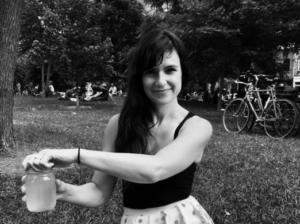Singing and cycling: two disciplines that may not, on the face of it, seem to fit together. But if you are the Bicycle Opera Project, it’s a match made in heaven.
The project was founded six years ago by sopranos Larissa Koniuk and Nadia Channa.
“We started because we were two young singers looking for opportunities,” Koniuk says, “and so we decided to make our own.”
Their intent was to delve in the contemporary Canadian repertoire and hopefully make it better known.
“There is such a wealth of amazing music written in Canada and I would say mainstream Canada has little knowledge of that.”
The two founders are also strong environmentalists and they wanted to find a car-free alternative to touring.
Koniuk says she had heard about some folk musicians who had toured by bicycle and thought it would work for her project.
“We are an acoustic show. We don’t need amplification.
“People ask us all the time ‘Do we sing on bikes?’ We sing for fun on bikes, but that’s not the project. We are touring contemporary Canadian opera on bicycles.”
So up to nine singers, a conductor and a stage manager cycle from town to town towing three trailers full of props and costumes. They travel light with one change of clothes as they tour southern Ontario from London in the west to Ottawa in the east.
“We arrive in a city. We stay overnight and the next day we present a show.”
Starting on Saturday, the Bicycle Opera will roll into Chamberfest 2017 bringing with them their production Sweat, about the women who work in garment sweatshops making the clothes we wear.
The Sweat tour began in Hamilton this past week. Because of time constraints the ensemble will board a train to get to Ottawa. When they get here, they will do a community cycle to Almonte, with impromptu pop up performances along the way. The public is invited along, Koniuk says. They’ll perform Sweat in Almonte on Sunday and then ride back to Ottawa and run the show again on Monday night.
After the Ottawa shows, they’ll cycle to Kingston, staying at friends’ cottages along the way. They’ll perform at the Isabel Bader Centre for the Performing Arts in Kingston.
They have had mishaps on the road, but nothing serious.

On the road in Nova Scotia. Photo: Larissa Koniuk
“We pop tubes pretty regularly. We carry repair kits so that’s not huge deal. Two summers ago we experimented with a mini-tour in Nova Scotia because we were working on an opera there. On that tour, our tenor broke a spoke on his bicycle on the gear side of the back wheel. He had to hitchhike to a nearby town. He encountered friendly strangers on the road who took him to a bike shop and mechanic at shop drove him back to where we were.”
Cycling does keep them fit.
“Long distance cycling is about endurance. … Every year we have new cyclists join us who have never done long distance cycling.
“We trust them at their word they will be able to handle it. They quickly realize the human body is capable of so much more than we ask of it. Our legs don’t just give out. It’s more likely you will be defeated mentally. The lesson then is just pull over, eat some sugar and you’ll be fine. Long distance cycling is all about calorie intake. You have to eat a lot.
“We all come together each summer to put on a tour. It is a big undertaking.”
Koniuk would love one day to tour Canada or even parts of Europe, meanwhile, they’ll keep touring southern Ontario, doing opera differently.
Bicycle Opera aims to make the art form more accessible.
“We try to break down barriers in a few different ways. One way is in what we do. When potential audiences hear we are cycling from town to town, I think it automatically breaks down a barrier. It’s not this elitist thing. We aren’t flying in from Europe. There is a real sense we are earthy, we are sweaty, we have bike grease on us.
“We perform in intimate spaces,” Koniuk aded We love being close to our audience and letting them experience the power of the human voice. And we generally perform in English.”
In contemporary music, she says, the singers are asked to experiment with a lot more musical colours.
“In an intimate space you are not concerned about having to cut over an orchestra. You are able to explore the whole range of colours. That’s why I love contemporary music. There are times when we are singing full out, but there are moments when it’s about the rhythm or the text.
“The composer Juliet Palmer has written interesting sections which mimics the sound of a factory. You can’t do that in big hall with a big orchestra.
“I think audiences will feel like they have seen a piece of theatre. But they will have no doubt opera singers making that piece of theatre.

Larissa Koniuk. Photo: Alexander Hajek
Sweat is unusual in another way. It is a cappella … without accompaniment.
“A capella is rare in opera. It’s not really done. For us, we have never done an a cappella piece before. This is also our first full-length premiere.”
Sweat was written with the Rana Plaza tragedy in Bangladesh in 2013 in which hundreds of garment workers, almost all women were buried in the collapse of an eight storey building, in mind.
For Bicycle Opera, the piece is a perfect fit.
“We love pieces that talk about the world we live in today.
“Juliet and Anna (Chatterton the librettist) wrote this piece as a response to the Rana collapse. Juliet had an interesting upbringing in that her mother sewed all her clothes. She grew up wearing handmade clothes. She talks about how, as an adult, she would buy clothing in stores and wondernwho had made them. It’s something that has been on her mind for a while.
“Our clothes are very intimate. They touch our skin but we rarely think of who made them.”
Sweat has a mostly female cast with one man who is the owner of the factory. It is very much about women’s stories.
The women in Sweat are archetypes.
“These are imagined characters, Koniuk says. The opera examines their hopes and dreams and realities.
“What did they leave behind to come to the factory? What do they want? There is a lot of dreaming of the future.
“The big conflict of the opera involves a union organizer who is trying to mobilize the women. In the opera as in real life when you push towards unionization it’s divisive. There are people who are afraid to stand up because they fear being met with violence.”
Sweat was commissioned by the Ontario Arts Council through Soundstreams a Toronto company and Opera Canada.
Soundstreams decided not to present the work. When that happened Juliet approached Koniuk and asked if Bicycle Opera would take up the challenge.
While this was happening a company in New York also decided to stage the work and did so last fall. Koniuk sang in that production.
In this version of Sweat, Koniuk plays The Neighbour who fights against The Union Organizer.
“The characters aren’t named they are known by their roles. That’s because the creators wanted it to be universal,” Kaniuk says. The opera has been directed by veteran stage artist Banuta Rubess. The cast also includes: Catherine Daniel, Caitlin Wood, Stephanie Tritchew, Keith Lam, Justine Owen, Emma Char, Alexandra Beley and Cindy Won.
Koniuk is optimistic about the future of Sweat.
“I’ve never produced something before that I feel has such a long trajectory ahead of it. I really believe in this project. It could be something that we do for awhile.”
At the very least, this is one show where the theatre tradition of wishing good luck with the phrase ‘Break a leg’, probably shouldn’t apply.
Sweat: The Bicycle Opera Project
Chamberfest 2017
When: July 22, starting at 9 a.m. The cast of Bicycle Opera cycles from Ottawa to Almonte, with pop up performances along the way. For information on the route and performance locations, please check chamberfest.com.
When: July 23 at 2 p.m.
Where: Mississippi Valley Textile Museum, 3 Rosamond St. E., Almonte
Tickets: chamberfest.com
When: July 24 at 10 p.m.
Where: La Nouvelle Scène, Gilles Desjardins 333 King Edward Ave.
Tickets: chamberfest.com







